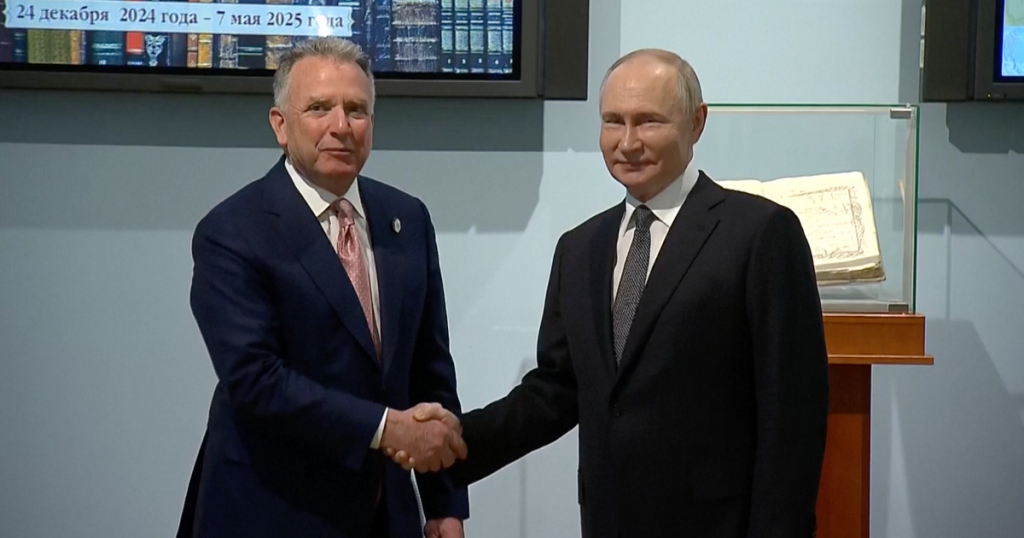Recent discussions surrounding the ongoing conflict in Ukraine have intensified, especially following a meeting between President Trump’s special envoy, Steve Witkoff, and Russian President Vladimir Putin. This meeting aimed to pave the way towards a potential ceasefire amid the continuing hostilities that have escalated since 2022. Officials have expressed cautious optimism, although significant breakthroughs appear unlikely in the near future.
| Article Subheadings |
|---|
| 1) Recent Diplomatic Meetings and Their Context |
| 2) Statements from Key Political Figures |
| 3) The Humanitarian Cost of the Conflict |
| 4) Challenges Ahead in Negotiations |
| 5) Potential Outcomes of Ongoing Diplomacy |
Recent Diplomatic Meetings and Their Context
The latest round of talks between Steve Witkoff, a special envoy under President Trump, and Russian President Vladimir Putin, took place amidst ongoing tensions surrounding the Ukraine conflict. This meeting is significant as it represents the third encounter between Witkoff and Putin since Trump’s return to the White House. The discussions are framed within the broader narrative of seeking peace after the prolonged violence initiated by Russia’s full-scale invasion of Ukraine in 2022.
The diplomatic efforts aim to culminate in a ceasefire agreement that would ideally lead to a stable peace deal. Witkoff’s role is crucial, representing U.S. interests while maneuvering the complexities of Russian geopolitical strategies. The timing of these discussions also coincides with international concerns over the rising death toll and humanitarian crises stemming from the conflict.
Statements from Key Political Figures
During a recent briefing, White House Press Secretary Karoline Leavitt reiterated the administration’s position, emphasizing the urgent need to cease hostilities. “This is another step in the negotiating process towards a ceasefire and an ultimate peace deal in Russia and Ukraine,” Leavitt stated, aiming to convey a sense of progress in diplomatic discussions. However, she chose not to disclose specifics, cautioning against premature speculation regarding the outcomes.
In a separate statement, President Trump expressed his frustrations over the ongoing conflict, urging Russia to take decisive action. He highlighted the human cost associated with the war, indicating that the current casualty rates are unacceptable. Trump stated, “Too many people are dying, thousands a week, in a terrible and senseless war,” portraying a deep concern for the humanitarian implications intertwined with the geopolitical agenda.
The Humanitarian Cost of the Conflict
The war has inflicted severe humanitarian consequences, with escalating casualties and displacements marking the past two years. As the conflict continues, reports depict harrowing accounts of civilians caught in the crossfire, prompting widespread calls for action from humanitarian organizations globally. Recent statistics show that thousands are killed each week, emphasizing the urgency for peace initiatives and relief efforts.
The impact of the war extends beyond immediate physical harm; it disrupts entire communities, burgeoning refugee crises, and dwindling resources for basic necessities. Civilians living in affected regions face challenges in accessing healthcare, food, and shelter. Thus, negotiations for a ceasefire are not only a diplomatic necessity but a moral imperative reflecting the global call for compassion and effective intervention.
Challenges Ahead in Negotiations
While the recent meetings may suggest a path to ceasefire talks, numerous hurdles remain. According to Dmitry Peskov, a spokesperson for the Kremlin, there are no expectations for immediate breakthroughs. Historical distrust, ideological differences, and prior failures in negotiations pose significant obstacles to achieving lasting peace.
Moreover, both sides are entrenched in their positions, complicating the negotiations. The complexity of geopolitical frameworks in play adds to the uncertainty. The diplomatic team faces the challenge of reconciling conflicting agendas. Without mutual concessions, the prospect for successful dialogue remains precarious.
Potential Outcomes of Ongoing Diplomacy
As civil discussions resume, the potential outcomes are multifaceted and contingent on several variables. A ceasefire, if established, could halt immediate hostilities and open avenues for further negotiations. This could lead to more comprehensive agreements addressing the long-standing issues between Russia and Ukraine, including territorial disputes and security protocols.
Moreover, diplomatic success might influence U.S.-Russia relations in broader terms, potentially paving the way for more significant strategic agreements regarding arms reduction and regional security. However, as stated by analysts, the road to peace is complex. Continued commitment from international stakeholders is essential to ensure that any agreements reached are not merely temporary measures but foundational steps towards sustained peace.
| No. | Key Points |
|---|---|
| 1 | Witkoff’s third meeting with Putin focused on advancing ceasefire negotiations in Ukraine. |
| 2 | Statements from officials reflect deep concern over the humanitarian costs of the war, stressing the need for urgent action. |
| 3 | Significant challenges remain in the negotiations, with historical distrust and conflicting agendas hindering progress. |
| 4 | A ceasefire could lead to lasting peace agreements, impacting broader U.S.-Russia relations positively. |
| 5 | Negotiations reflect a complex geopolitical landscape with uncertainty surrounding potential outcomes. |
Summary
The ongoing discussions between U.S. officials and Russian leaders symbolize critical steps towards ending an entrenched conflict that has claimed thousands of lives. While the ambitions to reach a ceasefire appear genuine, numerous hurdles must be overcome. The legitimacy and effectiveness of these negotiations can potentially reshape the geopolitical landscape, reiterating the necessity of collaboration amidst discord.
Frequently Asked Questions
Question: What is the purpose of the meetings between U.S. envoys and Russian officials?
The meetings aim to negotiate a ceasefire and ultimately establish a peace deal to resolve the ongoing conflict in Ukraine.
Question: What are the humanitarian implications of the Ukraine conflict?
The conflict has caused significant casualty rates and humanitarian crises, disrupting basic access to health, food, and shelter for many civilians.
Question: Why are negotiations facing significant challenges?
Negotiations face challenges due to historical distrust, conflicting agendas, and a lack of mutual concessions between the involved parties.
